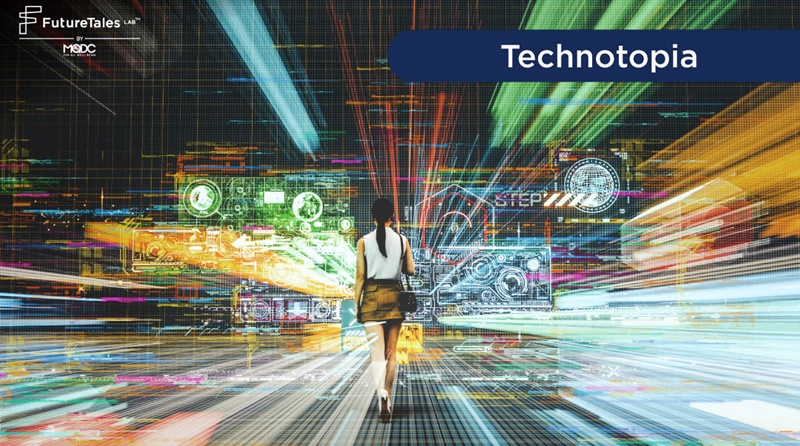5 Future Scenarios for Bangkok in the Next 30 Years from FutureTales Lab by MQDC
11 October 2021, Bangkok – Dr. Karndee Leopairote, Executive Vice President of FutureTales Lab by MQDC, said the lab with Arup Foresight and Innovation, Australia, has researched 5 future scenarios in the next 30 years to 2050 for Greater Bangkok, which extends 150 km east from the city. The scenario analysis covers 6 dimensions: Live, Work, Learn, Play, Mobility, and Sustainability.
“The 5 future scenarios for Greater Bangkok are an extension of megatrends research we’ve published. In researching urbanization, future scenarios can help us find the futures we all want, which doesn’t just involve people but also biodiversity, other organisms in the ecosystem, and the environment. These future scenarios don’t clearly show what will or won’t happen. They help provide a more comprehensive analysis. Each scenario presents both opportunities and challenges. They help inspire us to prepare in time for future events,” said Dr. Karndee.
Dr. Anne Kovachevich, Head of Arup Foresight and Innovation, Australia, said: “As the world starts to emerge from the COVID-19 pandemic, it is an interesting time to look out to 2050 and imagine the possible futures of Greater Bangkok. The last few years have seen major shifts in the way we work, live, commute, and play, and alongside that a demonstration of the human ability to adapt. Climate change impacts are clearly visible and becoming more common and extreme; the importance of health and wellbeing has been highlighted by the pandemic and cities are designing in active, healthy solutions; an aging population requires solutions for keeping both body and mind active. Amongst others, we have drawn on a few of these global trends to create 5 plausible futures for the city. These scenarios can be used to test strategies, help identify blind spots, or consider future complexities and opportunities for Greater Bangkok.”
Dr. Pannin Sumanasrethakul, Foresight Research Director at FutureTales Lab by MQDC, said that research revealed 5 future scenarios for Greater Bangkok.
Technotopia
The main factors driving this scenario are developments in automation, regional transport, and community engagement. In this scenario, a 7-year-old child may join classes online from his bedroom using VR devices. In the next 30 years, after the global impact of COVID-19, tech companies and advanced countries will bring new technology. Thailand may start thinking and operating under the governance of tech giants.
Ensuring debt management by 2030, this will help Thailand to catalyst the domestic economy and develop the city and its surroundings reaching toward population of over 25 million people. Thailand could thereby become one of Asia’s business hubs by 2050.
Urban Playgrounds
People of all ages will pay more attention to health and exercise. Policies will promote the development of the city to support activities and develop its people’s skills, also attracting more workers from abroad. Technology will meet the needs of residents, helping those with physical handicaps.
Thailand should aim to develop the city and its surroundings so people of all ages can live healthily and safely. The well-being of city residents should be promoted by 2030 with active lifestyles. That would help Thailand by 2050 will be able to attract people globally who are interested in active lifestyles.
Decentralised Resilience
Adapting to climate change includes co-creating residential areas with communities. Transport in Bangkok and its surroundings cities adjusts to rising water levels. Taking care of people in the city and its surroundings is a priority.
Drought and flooding are set to be the main challenges, affecting transport and the food system. Adaption and relocation will fuel inequality. Older areas affected by issues such as rising sea levels will contrast with newly developed neighborhoods. Poorer people will have to evacuate to abandoned buildings or move further out of the city. Informal innovations in the city may include floating houses or housing pods. Abandoned buildings may be used for vertical farms.
Based on this scenario, Thailand should focus on solving the problems of drought and flooding in Bangkok and its surroundings. This will lead to the development of mixed-use industrial areas and new lifestyles by 2030. Thailand will thereby have a city that copes with various natural disasters and manages these problems well by 2050.
Accelerated Generations
Education and skill development are greatly improved in Bangkok and its surroundings to bring older adults back into the labor market. The community is involved in helping design the city to meet the needs of urban development and take care of the environment.
To meet the needs of older adults and bring them back into society Thailand must apply the proper economic concepts. Implementing values that focus on family and environmental balance by 2030, Thailand will achieve leadership in startups by 2050. People of all ages will be integrated into the workforce, where the knowledge and expertise of older adults will combine with the new concepts of younger generations.
Transforming Lifestyles
Tourism will grow as environmental protection helps drives ecotourism and health tourism. Developing the skills of people in the tourism industry will also be important. The tourism industry’s outlook will be altered by the pandemic. Rather than looking at tourist numbers, the industry will focus on visitors who stay a long time, drawn by physical and mental well-being. Access to good quality of life and healthcare encourages people to slow down and value well-being and the environment.
Under this scenario, Thailand should focus on skills development to devise a strategy for the city and its surroundings to be a green megacity by 2030 that restores physical and mental health. Developing skills will attract workers from all over the world to a city that promotes well-being, including learning, which is the main goal for 2050.
“FutureTales Lab by MQDC has analyzed and studied each scenario from various angles for the next 30 years. For policymakers and communities we can provide recommendations for urban development, enabling everyone to prepare for achieving a desired future together,” said Dr. Sumanasrethakul.
Reference: Future of Urbanization Scenarios research.
Megatrends : https://drive.google.com/file/d/1FwJDRUFtCheTytxggg-nItHqmmnr1ivy/view
Future Scenarios : https://drive.google.com/file/d/1ecBXkbiKWW6shULsbaUz9BrR_R6xRHfs/view



